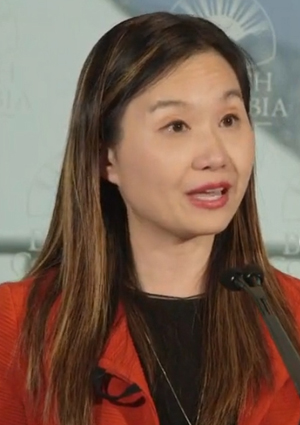
Friday April 24, 2020 ~ BC
by Mary Brooke ~ West Shore Voice News
Targeted funding will give people in rural, remote and Indigenous communities in British Columbia access to faster internet services at a time when they need them most, will help communities during the COVID-19 pandemic, it was announced today in a live media event at 3 pm by Minister of Citizens’ Services Anne Kang.
The $50-million Connecting British Columbia program — using already-budgeted funds — now includes a funding stream to help internet service providers with immediate network equipment upgrades to rapidly improve capacity and internet speeds in underserved communities throughout the province.
Increased demand for internet access during COVID-19:

“People working from home, students learning remotely and families practising physical distancing all need to know they can depend on internet access during this public-health emergency,” said Kang.
“Responding to the pandemic requires the best from all of us. Our communities need reliable internet access right now, and this new fund will get projects completed quickly.”
Physical distancing requirements resulting from the COVID-19 public-health emergency mean more people are staying home to work, study or be with their families. Internet service providers (ISPs) have reported an increased demand on networks, which in some cases can cause slowdowns or even outages. Connecting British Columbia’s COVID-19 response funding will enable ISPs to make immediate upgrades to their networks in order to better support the people who count on their services.
Funding aimed at supporting expansion by Internet Service Providers:
“The British Columbia Broadband Association really appreciates the effort to provide immediate assistance to internet service providers as they work to upgrade networks serving people during this public health emergency,” said Bob Allen, BCBA president. “Our members are excited to deliver new projects by the end of June that will provide immediate improvements to high-speed internet services for people.”

The BC Broadband Association presently has their 2020 conference with theme of “5G or Fibre Optic? What works where?” set for September 29 and 30 at the Radisson Hotel in Richmond, BC. However, depending on the gathering-size restrictions by the Provincial Health Officer during COVID-19, that event may need to become a virtual conference in 2020, says Allen.
The BCBA conference that draws about 275 people is apparently the only one of its kind in Western Canada and is attended by major incumbents as well as smaller community-based Wireless ISPs. The organization sees about 50 wireless ISP businesses in its membership. There are 100 wireless broadband providers in BC, says Allen.
Funding amount and opportunity:
Internet service providers throughout BC can apply for grants of up to $50,000 — or 90% of their expenses — to cover the cost of equipment, including antennas, electronics or other types of devices that relate to the performance or range of their network, it was stated by Minister Kang today.
The funds are available on a first-come, first-served basis, which is how much of the rollouts during COVID-19 are happening in BC and federally. Intentionally or not, this means that existing businesses must act quickly even if presently at any sort of operational disadvantage. But it also means that anyone looking to jump on suddenly to an opportunity they weren’t in an organizational capacity to deliver on previously may be less likely to be ready to seize the opportunity. Still, the method of using existing programs to help businesses and individuals during COVID-19 is a process beginning to meet with some critique.
Allen says that the BC Government approached BCBA to find out how the government could help. The model of a $50,000 grant is efficient, says Allen. There is low overhead to the ISP, it’s relatively easy for the business to do the followup paperwork, the inspections are done quickly, and thereby the payment to suppliers can be achieved quickly too.
Quick completion of network upgrades:
These are types of network upgrades that can be completed quickly to significantly improve connectivity for people, rather than the traditional projects that usually require months or years to finish, said Minister Kang.
Applications are now being accepted by Northern Development Initiative Trust. Submissions will be reviewed on a first-come-first-served basis, with funding decisions made within three to five business days. Internet service providers must complete their projects by June 30, 2020.
“We all have to work together to protect the health and safety of our families and neighbours,” said Joel McKay, CEO, Northern Development Initiative Trust. “Immediate investments in network upgrades can help ensure that people have the reliable internet access they need, not just to work and study from home, but to keep in touch remotely with friends and family during this challenging time.”
Connecting BC Program:
Grants will be funded through the existing Connecting British Columbia program. Applications are being accepted for both the new COVID-19 response funding and the existing Phase 3 Connecting British Columbia quarterly intake.
Since July 2017, there have been 479 communities, including 83 Indigenous communities, have benefited from completed or underway Connecting British Columbia high-speed internet connectivity projects.
Targeted areas:
Most parts of south and central Vancouver Island are already serviced by wired companies (such as Shaw, TELUS, and Rogers) though certainly many areas of northern Vancouver Island and also the small islands either use or would benefit by enhanced wireless service.
Allen says that areas on the mainland such as in the Kootenays, rural Osoyoos, areas of the Okanagan, Chilcotin, and Atlin would be possible areas for expanding wireless strength quickly with the new government grant program.
He stresses that it’s only areas already serviced by wireless that will benefit by this program, as there isn’t time to start up a new service within the current program timeframe.
======== LINKS:
Application for Connecting British Columbia COVID-19 response funding: https://www.northerndevelopment.bc.ca/funding-programs/partner-programs/connecting-british-columbia/phase-three-last-mile-transport-infrastructure/
Connecting British Columbia Program: https://www.northerndevelopment.bc.ca/funding-programs/partner-programs/connecting-british-columbia/
Phase 3 Connecting British Columbia funding application information: https://www.northerndevelopment.bc.ca/funding-programs/partner-programs/connecting-british-columbia/phase-three-last-mile-transport-infrastructure/ Connectivity in British Columbia: https://www2.gov.bc.ca/gov/content/governments/connectivity-in-bc


